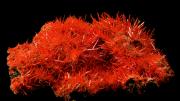Among the 3,200 rocks on display at the Harvard Museum of Natural History's Mineralogical Museum and the tens of thousands more in drawersare many dazzlers, including this lead chromate piece, about 10 inches wide, called crocoite. The name comes from the Greek krokos, meaning "saffron," a reference to the bright red-orange color of the mineral, which typically forms prismatic crystals sometimes two or more inches in length.
Nature makes this eye candy by infiltrating veins of oxidized lead with chromium- bearing fluids. Its chemical formula is PbCrO4. The mineral is of little economic value but has been used in paint. The man-made color chrome yellow has the same chemical formula, although crocoite is far prettier than any school bus. The mineral was first described scientifically after its discovery in the 1760s in Berezovskoe, a gold-mining district on the east slope of Russia's Ural Mountains. Frank Mihajlowits mined the specimen below in the 1970s at the Adelaide Mine in the Dundas area of Tasmania, Australia, where the crocoite most coveted by collectors is found. "Specimens from Berezovskoe typically lie flat on a buff-colored sandstone," says Carl A. Francis, associate curator of the Mineralogical Museum, "so they don't have the aesthetic appeal of the specimens from Dundas." Harvard also has crocoite from Minas Gerais, Brazil; Saxony, Germany; and Otjozondjupa, Namibia, but Tasmania takes the prize.
In 2000, that state's governor, the Honorable Sir Guy Stephen Montague Green, proclaimed the adoption of crocoite as the mineral emblem of Tasmania. Reporting the event, the Tasmanian Government Gazette called specimens of crocoite "amongst nature's most brilliant creations" and "amongst the most beautiful objects to originate underground."









